Cornell hockey has experienced several such achievements. The 1969-70 season is the starkest example. Paradoxically, what makes that season most deserving of celebration is the fact that the end result was guaranteed at no point when the 1969-70 team was progressing through its schedule and accumulating wins. Statistical accolades and primacy as the owner of an unchallenged status in college-hockey history is satisfactory, but to understand the meaning of the 1969-70 season, one must understand the triumph of will and spirit that generated a result that now seems all but destined.
The postseason success of Cornell continued through the 1970 ECAC Tournament. The skaters from East Hill brought back to Central New York a fourth consecutive ECAC Championship. They had managed to achieve this feat without the awe-inspiring skill set of already legendary goaltender Ken Dryden. Dryden's career ended upon his graduation in May 1969. Naysayers believed that his graduation would mark a decline in the quality of Cornell hockey. Harkness and his 1969-70 team had proven otherwise.
A trophy for a fourth ECAC Championship was not the only thing carried in tow back to Ithaca on March 14, 1970. The Big Red carried with it a clean slate. A perfect slate. Cornell had suffered no losses and no ties during the regular season or its run through Boston Garden. Cornell shouldered this accolade into the 1970 national tournament. Every opponent that Cornell confronted would be aiming to mar perfection with a first blemish. The Red skaters would be marked.
The distaste for participation and runners-up trophies is engrained deeply into the culture of Cornell hockey. One of the most poignant displays of the early genesis of this ethos occurred at the end of the 1968-69 season. Cornell closed that season with a third consecutive ECAC Championship. Harkness' players grappled through a difficult 1969 NCAA Tournament. It was Ned Harkness' second appearance in the national-title game behind the bench at Cornell. It was Ken Dryden's senior campaign. It would end in a loss. Cornell was unable to rally from a 4-2 deficit.
Harkness politely accepted the second-place trophy after Cornell fell to Murray Armstrong's Denver team in March 1969. The look of despair and disappointment was apparent on his face. Cornell hockey had come to embody greatness. Second place was not good enough. Championships were what was now glorified and expected on East Hill. Finishing second with a roster so talented was not sufficient. A culture had been born. This mindset persists within the institution of Cornell hockey. Harkness was determined that he would be better.
The field of the 1970 NCAA Tournament was constituted of Clarkson, Cornell, Michigan Tech, and Wisconsin. Cornell just defeated the Golden Knights in a tight 3-2 contest in the 1970 ECAC Championship Final. Clarkson was keen for revenge. The Cornell team buoyed by overzealous Lynah Faithful on East Hill had its focus on perfection.
Michigan Tech was the only other team in the 1970 NCAA Tournament that had won the ultimate prize of college hockey. The Huskies of Michigan's Upper Peninsula won national championships in 1962 and 1965. They had failed in their latest attempt to add to that total in the 1969 NCAA Tournament. Cornell had defeated the Huskies with a 4-3 overtime victory in that national tournament. John MacInnes hoped to lead Michigan Tech to vengeance with ending Cornell's bid for a perfect season.
MacInnes led his Huskies to their first consecutive appearances in the NCAA Tournament through a victory in the East Regional of the 1970 WCHA Tournament. The WCHA in the era of the 1969-70 season divided its Conference into East and West Regionals. The victor of each regional would receive the Conference's berths to the national tournament. Michigan Tech defeated a Minnesota team that won the MacNaughton Cup in a 6-5 WCHA Championship Final.
Wisconsin earned its first berth to an NCAA Tournament after its first season in the WCHA. The Western conference of college hockey admitted the Badgers at the beginning of the 1969-70 season. Their first season was a success. Wisconsin had powered its way through a difficult WCHA Tournament with victories over Michigan and Denver. Wisconsin won the West Regional of the 1970 WCHA Tournament. Wisconsin had no intentions of allowing its run to end easily.
The field of the 1970 NCAA Tournament was dotted with uncertainty for Cornell. The Red skaters had met neither Michigan Tech nor Wisconsin during the 1969-70 season. Clarkson was the lone opponent with which Cornell was acquainted. Cornell possessed still the advantage of experience. The Big Red was the most seasoned roster in terms of experience in the national tournament.
Wisconsin had never appeared in the national tournament. Clarkson had no remaining players on its roster who remembered the Golden Knights's trip to the 1966 NCAA Tournament. Michigan Tech had competed in the 1969 NCAA Tournament. Cornell boasted 15 players on its roster who had competed in at least one NCAA Tournament. This was a product of Cornell's four consecutive appearances in the national tournament. Cornell knew what to expect better than any other team in the 1970 NCAA Tournament.
The semifinal contests paired Clarkson against Michigan Tech and Cornell against Wisconsin. Michigan Tech would need to defeat Clarkson if it wanted a chance at revenge against Cornell. Wisconsin hoped to cap its impressive first season in the WCHA with ending the Red's perfect season.
The contest between Cornell and Wisconsin represented a role reversal. Three years before Cornell had been the uninitiated and inexperienced first-time competitor in the national tournament. It represented a new challenge from the East. Cornell was now the seasoned team and program that would welcome a competitive team from the West to the national tournament. Wisconsin in 1970, like Cornell in 1967, was ready for the challenge.
The teams that took the ice of Jack Shea Arena on March 19, 1970 had more similarities than their sets of uniforms. Coaches who would become legends of the college-hockey game stepped behind each bench. Ned Harkness was leading Cornell into its fourth national tournament and seeking his second national championship won while on East Hill. Bob Johnson was coaching Wisconsin to its first appearance in the national tournament. Both coaches had similar ethics in how they directed their teams.
Wisconsin had become already known for its grueling and often brutal style of play. The similarly clad skaters from Central New York perfected a variation on the same tenets. Neither team nor program was known to yield. It is this relentlessness and physicality that typifies clashes between Cornell and Wisconsin. It is unlikely that Harkness, Johnson, either of their teams, or anyone knew it that evening, but they were about to witness the birth of a classic rivalry of the NCAA Tournament between two historic programs.
A superb goaltender backstopped the Badgers. Wayne Thomas stood tall for Wisconsin. Cornell would need to solve him to win the contest. Thomas had some commentators comparing him to another tall goaltender with whom Cornell was very familiar. A netminder whose size and legend had earned the current tender of Cornell's pipes the nickname "the Little Kid." Brian Cropper would need to be Thomas's equal for at least 60 minutes of play.
The moment the puck dropped the advantages for each squad became apparent despite the similar style of play of the teams. Wisconsin was far larger. Cornell was exceedingly faster. Momentum trumped might as the game began. The swifter Cornellians asserted a strong presence in Badger territory. A Red deluge from the white-clad skaters of Cornell pummeled Thomas. Despite continual harassment, the Badger would not surrender.
A quarter of the first period had elapsed before Wisconsin muscled its way back into the contest. Cornell was whistled for a penalty at 6:22. Wisconsin established a strong presence in Cornell's zone. A Badger positioned behind the net found Wisconsin's Bob Poffenroth on Cropper's doorstep. Poffenroth received the puck and delivered it into the Red net. A small but loyal Wisconsin contingent erupted in the stands of Jack Shea Arena. Approximately 100 Badger fans had made the trip to New York. Nearly every member of their contingent knew the steep odds that their team was given to win the contest. Their team had faith in its reliable goaltender and had given Cornell a deficit to overcome.
Control of the game began to slip away from Cornell. Wisconsin followed its power-play goal with several nearly fatal challenges. The Big Red defense had few answers to them. Poffenroth from the slower Westerners bested Cornell's blueliners and charged in on Cropper on a breakaway. The junior goaltender answered. He would need to soon after make a phenomenal stop on another surrendered two-on-one breakaway. The Little Kid was doing what he needed until his defensive corp and forwards recovered.
John Hughes provided a response. The senior captain saw a lane to Thomas. He unleashed a blast that scorched his stick. Wisconsin's goaltender extinguished the threat it posed. Thomas made the Badgers's one marker seem insurmountable in the first period. However, Cornell had regained its composure and resolve. The second period was unlike the first.
Cornell continued to challenge Wisconsin in the physical contests of the game and continued to outrace them. A power play in the second frame seemed to be the tipping point of the game. Cornell would take the lead. Thomas stopped each blast that left a Red stick. The best challenge came from Brian McCutcheon. His directed shot struck iron. The Lynah Faithful who numbered approximately 1,000 for half of the capacity of Jack Shea Arena sighed. Wisconsin was staving off a seemingly unstoppable team in a defensive battle.
Cornell continued to control the zone but Wisconsin, most often in the form of Johnson's Wayne Thomas, held off the Big Red's best efforts to knot the game. The 1969-70 team amazingly seemed undaunted. Another power play in the second period ended with Thomas giving the fans of the Western team much to cheer. Wisconsin clung to its one-goal lead for another 20 minutes.
Kevin Pettit appeared to accomplish the once-impossible less than 30 seconds into the third period. Pettit had beaten Thomas's front pad, but the puck never entered the net as it was corralled under Wisconsin's goaltender. Each seemingly impossible save tended to make Cornell more focused on its efforts. Cropper stopped all of Wisconsin's attempts after the Badgers goals. The Little Kid was called upon only four times in the last two periods to hold the Badgers at bay. Cornell would not give Wisconsin or its netminder a chance to breathe.
Wisconsin held the 1969-70 team scoreless longer than any team did in the season. The Badger shutout would end. Defenseman Dan Lodboa slapped a shot on net. Thomas made the save predictably. The puck bounced off of the netminder onto the stick of Cornell's Garth Ryan. Ryan pounced. His first attempt missed. His second attempt missed. Thomas and Ryan were battling in the crease. The forward from Cornell bested Thomas with his third attempt. The game was tied.
The Lynah Faithful clamored and drowned the cheers of the opposition. The Faithful knew that the remaining 14:28 was more than enough time for Cornell to win the contest. They were right. Cornell would wait only 5:29.
A defensive lapse for Wisconsin left defenseman Bill Duthie in the slot. Duthie tallied only four goals during the season. He was an atypical offensive threat. A backhander from Duthie buckled the twine and bested the most ferocious Badger. Cornell took the lead with 8:59 remaining.
Thomas would surrender no more goals. Cornell would score no empty-net tallies. The puck from Duthie sent Cornell to its second consecutive national-title game while relegating Wisconsin and its Bob Johnson to wait longer for their first national titles. Clarkson defeated Michigan Tech in the remaining semifinal battle. The Golden Knights neutered the Huskies in a 4-3 contest.
Cornell confronted for the second time an ECAC foe that it defeated for the ECAC Championship in the same season in the NCAA Championship Final. Harkness and his skaters were victorious in the first meeting when Boston University was the opponent. They would be again when that foe was Clarkson.
The Big Red defeated the Golden Knights one week earlier in a close 3-2 contest. The meeting of the two teams in the 1970 NCAA Championship Final would witness twice as many goals scored. The efforts would be very dissimilar for both teams.
Clarkson had been denied twice before in the national-title game. Len Ceglarski and his Golden Knights hoped the third time would be the charm. Great expectations surrounded the game among both fanbases. Clarkson was ready to seize the moment for redemption. Cornell felt the pressure of its fans, demands of dynasty, and calls of destiny to complete its perfect season. The Lynah Faithful returned to Jack Shea Arena with increased numbers. Among those who joined the pilgrimage to the final game to cheer on Cornell to the unthinkable was Cornell alumnus Ken Dryden.
The roar of the carnelian-and-white stands was silenced early. Clarkson opened the scoring for the contest. It took Luc St. Jean a mere 20 seconds to put the Golden Knights on the board. The dominance of the Big Red at the close of its game against Wisconsin did not spill over into the national title game. Some fans were perplexed to see the 1969-70 team appear bewildered at times.
Cornell weathered the storm as it had so many times before in the season. Gordie Lowe helped Brian Cropper behind the blue line in biding time while the roster waited for the seemingly unstoppable Red to begin to roll. The line of Larry Fullan, Garth Ryan, and Dave Westner was the first to show signs of life for Cornell. It gave the Lynah Faithful hope after early disappointment. Garth Ryan missed a rebound. Larry Fullan then received a feed from Steve Giuliani. Fullan struck and gave the Lynah Faithful something more tangible.
Cornell would wait less than seven minutes when Garth Ryan scored on the power play. Clarkson would answer when the onrushing Golden Knights caught Brian Cropper committed outside of the crease after making three key stops. They skated the puck past him. The score of the game had ratcheted. Those in attendance knew at that moment that the game would be unlike the 1970 ECAC Championship Final in Boston Garden or Cornell's first game of the 1970 NCAA Tournament.
Clarkson scored the next goal of the contest. The third tally for Clarkson occurred less than four minutes into the second stanza. The residents of Potsdam began to conjure up images of an NCAA national championship trophy in their trophy case. The dynamic chemistry of Fullan, Ryan, and Westner could not be neutralized for long. The trio exploded at 13:31 of the second period to beat Bruce Bullock of Clarkson. Fullan directed the puck to Ryan. Ryan centered the puck to Westner. The sophomore recipient re-zeroed the game.
Cornell did not escape the second chapter without incident. Clarkson would have two power plays in the last six minutes of the period. Three Cornellians decided that their team had given the Golden Knights enough. Clarkson received no quarter. Defensemen Gordie Lowe and Dan Lodboa with forward Brian McCutcheon displayed heroics when ensuring that Clarkson had no threatening opportunities on their consecutive power plays. The trio killed the penalty with ease.
The first few minutes of the third period ticked by without incident. Neither team scored. Then, Clarkson was called for a trip. The power-play unit took the ice in Clarkson's zone for the face-off. No one could expect what was going to happen next.
One must imagine that before the puck struck the ice on that power play that dynamic captain Dan Lodboa gripped his stick a little more tightly. He resolved to himself that he was going to give his team the victory and place in history that it deserved, and his beloved coach his third national championship. Lodboa would lift his team.
Brian McCutcheon corralled the puck in the corner of the boards. He gave a slight gesture to Lodboa. The defensman known as Bo sprinted from the right face-off circle to the front of the crease. McCutcheon delivered a pass that landed on the tape of Lodboa's stick. The senior defenseman and captain sent the puck sailing over the shoulder of Bullock.
The Lodboan avalanche was not complete.
The missteps of two Cornellians gave the North Countrymen a chance to start a new game. The Golden Knights would benefit from a five-on-three opportunity. Dan Lodboa took the ice to kill the Golden Knights's two-man advantage. The defenseman gathered the puck behind Cropper. He looked down ice and saw a seam that few could see.
Lodboa skated out from behind the Red cage. The reliable and prolific defenseman split Clarkson's defenders with the honed skills of a forward. Clarkson's five tried to stop him but the tempest that stirred in the determined senior was unstoppable. He outmaneuvered each challenge from skaters in green and goldenrod. Quickly, Bullock was all that stood in front of him. The Clarkson netminder expected Lodboa to deke once more as he had on his rush. Dan Lodboa beat Bullock cleanly with a straight shot into the net.
Cornell demonstrated its superb talent and depth 4:19 later. The teams skated four-on-four. It was Cornell that found the opportunity. Brian McCutcheon, John Hughes, and Dan Lodboa stormed into the territory of the Golden Knights. The three had generated a three-on-one opportunity for the Big Red. They would not waste it. McCutcheon handed off the puck to the defenseman in the trio. As he had twice before in the contest, Lodboa found the back of the net for his team.
Lodboa scored one of the fastest hat tricks in the history of the NCAA Tournament. Dan Lodboa had notched three tallies within 7:14 in the ultimate game of the college-hockey season. This outburst propelled from stellar team work and his pure determination gave Cornell a 6-3 advantage. The game had only 7:43 remaining. The Golden Knights would tally one more goal. It would be the final goal of the contest.
The hat trick and end-to-end play of Dan Lodboa that buoyed Cornell to a national championship guaranteed the senior captain recognition as the most valuable player of the 1970 NCAA Tournament in the minds of nearly all in attendance. The voters for that accolade concurred. Dan Lodboa scored the championship-winning goal that completed the only perfect season with an NCAA national championship on an awe-inspiring drive of skill, finesse, and determination.
The offensive efforts of Larry Fullan, Steve Giuliani, Dan Lodboa, Brian McCutcheon, Garth Ryan, and Dave Westner guided Cornell in achieving the impossible. The defensive feats of Dan Lodboa, Brian McCutcheon, and Gordie Lowe were integral to Cornell's victory. The victory was a team effort despite the spectacle of the efforts of individuals in the game. The team achieved against stark adversity. The game represented a microcosm of the season.
Rumors had begun to swirl before the 1970 ECAC Championships and NCAA Tournament regarding Harkness' departure from East Hill. The legendary coach eventually would depart. The thought did not cross the minds of those celebrating on the ice with their coach.
The entire institution of Cornell hockey that evening reflected how appropriate it was for Harkness to become the first coach to complete a national-championship perfect season. The trainer for the Big Red, Alf Ekman, remarked later that Ned "makes everyone believe he is better than they possibly might be-- he makes them do it-- and manages to convey the importance of the game." He made believers of his 1969-70 squad first. That belief spread into revived fanaticism in Ithaca, Boston, and Lake Placid.
Ekman's analysis was profoundly astute. Hockey was important to Harkness. He made it important to his teams. He made it important to the Cornell community. Hockey came to manifest the sincerity, hard work, and skill that had been tenets of Cornellians for nearly a century before the legendary coach arrived. Cornell was wedded to hockey perfectly and permanently.
It was the players who achieved the feat. The dreams of a season without blemish did not exist at the outset of the season. Few thought that either the team or the program could survive the departure of a legend in Ken Dryden. Players crafted their own legends and proved that Cornell hockey not only survived, but it thrived at a higher level.
The record of 29-0-0 is as immortal as if it were chiseled in stone. Fans of distant programs conjure up imagines of undeniable perfection. The Lynah Faithful know the truth. That timeless statistic was the product of very human efforts. The accomplishment was not preordained. Cornell needed to rally to win all but one of its postseason contests. Several opponents believed that they had the 1969-70 team on the ropes. Each time the collective team found a way to win each contest.
The team was not the most dominant postseason team iced on East Hill. It was the most accomplished. The members of the historic team with a perfect record were determined and their victories represent a triumph of human determination and will. They believed in each other when others did not. They gave their loyal fans reason to remain faithful when there seemed few. Hard work, strength of will, and resolve were the greatest contributors to their success.
The humility to work as a team and a yeomanly ethic made the perfect 1969-70 season distinctly Cornellian. It is fitting that only Cornell has achieved this feat. Most who venerate the team omit this human element. It has become a symbol of an unattainable goal once reached. As the roar of the Lynah Faithful continued to echo through the Adirondacks as Ned Harkness, and captains Dick Bertrand, John Hughes, and Dan Lodboa gathered for photographs, the reality of the accomplishments of a season had not been lost to legend. The Cornellians on the ice knew what delivered them to this moment when the sweat of competition and overcome odds still dampened their sweaters.
Bob Aitchison, Ed Ambis, Dick Bertrand (C), Craig Brush, Brian Cropper (G), Mark Davis, Bill Duthie, Larry Fullan,
Rick Fullan, Steve Giuliani, Jim Higgs, John Hughes (C), Dan Lodboa (C), Gordie Lowe, Brian McCutcheon, Ian Orr,
Bill Perras, Kevin Pettit, Bob Rule (G), Garth Ryan, Ron Simpson, Doug Stewart, Dave Westner
- Navigate the Rafters -




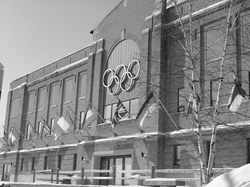
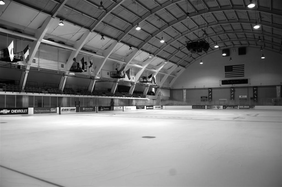
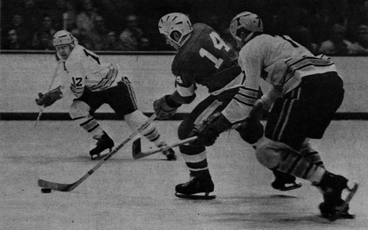
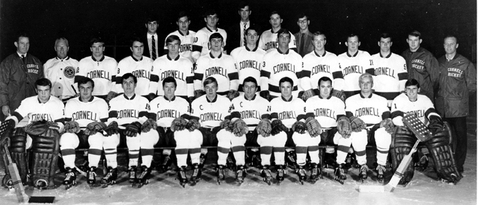


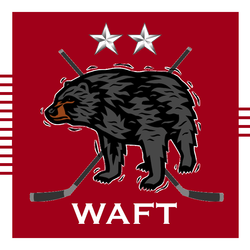

 RSS Feed
RSS Feed
